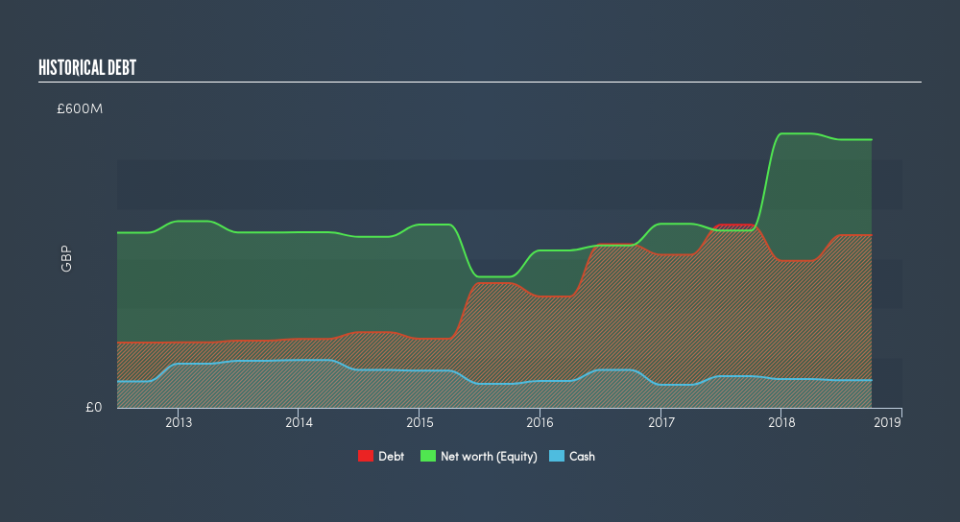What You Must Know About HomeServe plc's (LON:HSV) Financial Strength

Small-cap and large-cap companies receive a lot of attention from investors, but mid-cap stocks like HomeServe plc (LON:HSV), with a market cap of UK£3.8b, are often out of the spotlight. However, generally ignored mid-caps have historically delivered better risk adjusted returns than both of those groups. Let’s take a look at HSV’s debt concentration and assess their financial liquidity to get an idea of their ability to fund strategic acquisitions and grow through cyclical pressures. Note that this information is centred entirely on financial health and is a top-level understanding, so I encourage you to look further into HSV here.
See our latest analysis for HomeServe
Does HSV Produce Much Cash Relative To Its Debt?
HSV has shrunk its total debt levels in the last twelve months, from UK£368m to UK£347m – this includes long-term debt. With this reduction in debt, HSV currently has UK£56m remaining in cash and short-term investments , ready to be used for running the business. On top of this, HSV has produced cash from operations of UK£136m over the same time period, resulting in an operating cash to total debt ratio of 39%, meaning that HSV’s debt is appropriately covered by operating cash.
Can HSV meet its short-term obligations with the cash in hand?
At the current liabilities level of UK£503m, it appears that the company has been able to meet these obligations given the level of current assets of UK£546m, with a current ratio of 1.08x. The current ratio is calculated by dividing current assets by current liabilities. Usually, for Commercial Services companies, this is a suitable ratio since there is a bit of a cash buffer without leaving too much capital in a low-return environment.
Does HSV face the risk of succumbing to its debt-load?
With a debt-to-equity ratio of 64%, HSV can be considered as an above-average leveraged company. This is not unusual for mid-caps as debt tends to be a cheaper and faster source of funding for some businesses. We can test if HSV’s debt levels are sustainable by measuring interest payments against earnings of a company. Ideally, earnings before interest and tax (EBIT) should cover net interest by at least three times. For HSV, the ratio of 15.81x suggests that interest is comfortably covered, which means that lenders may be less hesitant to lend out more funding as HSV’s high interest coverage is seen as responsible and safe practice.
Next Steps:
HSV’s high cash coverage means that, although its debt levels are high, the company is able to utilise its borrowings efficiently in order to generate cash flow. Since there is also no concerns around HSV's liquidity needs, this may be its optimal capital structure for the time being. Keep in mind I haven't considered other factors such as how HSV has been performing in the past. I recommend you continue to research HomeServe to get a more holistic view of the mid-cap by looking at:
Future Outlook: What are well-informed industry analysts predicting for HSV’s future growth? Take a look at our free research report of analyst consensus for HSV’s outlook.
Valuation: What is HSV worth today? Is the stock undervalued, even when its growth outlook is factored into its intrinsic value? The intrinsic value infographic in our free research report helps visualize whether HSV is currently mispriced by the market.
Other High-Performing Stocks: Are there other stocks that provide better prospects with proven track records? Explore our free list of these great stocks here.
We aim to bring you long-term focused research analysis driven by fundamental data. Note that our analysis may not factor in the latest price-sensitive company announcements or qualitative material.
If you spot an error that warrants correction, please contact the editor at editorial-team@simplywallst.com. This article by Simply Wall St is general in nature. It does not constitute a recommendation to buy or sell any stock, and does not take account of your objectives, or your financial situation. Simply Wall St has no position in the stocks mentioned. Thank you for reading.


